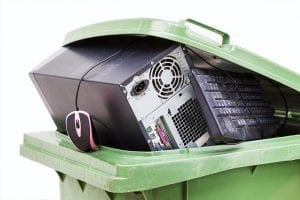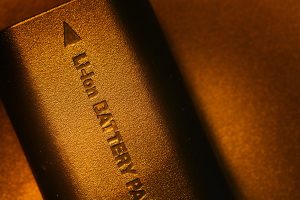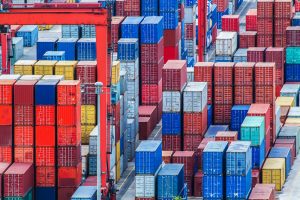 Primarily known for its curbside recyclables collection and sorting services, Waste Management is also a player in the e-scrap world, and its collection tonnage is on the rise.
Primarily known for its curbside recyclables collection and sorting services, Waste Management is also a player in the e-scrap world, and its collection tonnage is on the rise.

 Colin Staub was a reporter and associate editor at Resource Recycling until August 2025.
Colin Staub was a reporter and associate editor at Resource Recycling until August 2025. Primarily known for its curbside recyclables collection and sorting services, Waste Management is also a player in the e-scrap world, and its collection tonnage is on the rise.
Primarily known for its curbside recyclables collection and sorting services, Waste Management is also a player in the e-scrap world, and its collection tonnage is on the rise.

The Nulife property in Virginia is currently listed for sale.
Nulife Glass has removed all CRT materials from its shuttered Virginia site, which was the last of the company’s locations where leaded glass was being stored.
 The U.S. Department of Energy will award $5.5 million to companies advancing lithium-ion battery recycling technology, and it will dedicate $15 million to developing a research center focused on the material.
The U.S. Department of Energy will award $5.5 million to companies advancing lithium-ion battery recycling technology, and it will dedicate $15 million to developing a research center focused on the material.
 A processor will expand its headquarters, bringing additional inventory storage space and consolidating its Arizona processing operations in a single location.
A processor will expand its headquarters, bringing additional inventory storage space and consolidating its Arizona processing operations in a single location.

The Schupan & Sons headquarters in Kalamazoo, Mich.
Schupan & Sons is upgrading its Kalamazoo, Mich. campus with an expansion of its e-scrap operations and a dedicated health care clinic for company employees.
 E-scrap exports to Hong Kong will require more due diligence beginning in January, when the semi-autonomous region implements new import and recycling permit requirements.
E-scrap exports to Hong Kong will require more due diligence beginning in January, when the semi-autonomous region implements new import and recycling permit requirements.
 Two men accused of stockpiling and taking steps to illegally dispose of CRT glass have pleaded guilty to federal hazardous waste violations. One of them has been sentenced to probation.
Two men accused of stockpiling and taking steps to illegally dispose of CRT glass have pleaded guilty to federal hazardous waste violations. One of them has been sentenced to probation.
 Import policies in China and Southeast Asia continue to tighten, making it more difficult to move certain e-scrap materials to international markets.
Import policies in China and Southeast Asia continue to tighten, making it more difficult to move certain e-scrap materials to international markets.

Serdar Bankaci, Gary Curtis, Miles Harter and Rob Schafer discuss a range of industry topics at the 2018 E-Scrap Conference in New Orleans.
Material markets have shifted over the past year, but commodity pricing is just one of myriad forces that are constantly shaping and reshaping the e-scrap and ITAD sector.
 The owners of Seattle processor Total Reclaim have pleaded guilty to federal conspiracy crimes, marking the latest development in the fallout from the company’s exports of LCD devices to Hong Kong.
The owners of Seattle processor Total Reclaim have pleaded guilty to federal conspiracy crimes, marking the latest development in the fallout from the company’s exports of LCD devices to Hong Kong.
